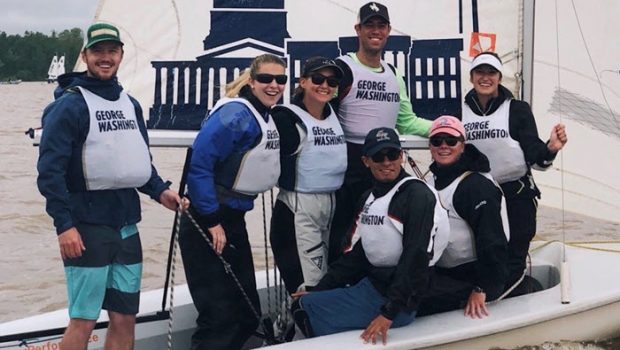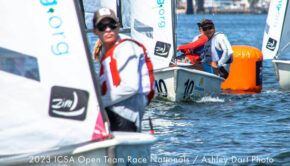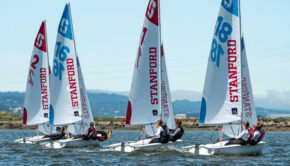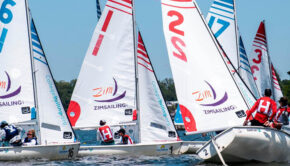George Washington: Raising the bar
Published on June 10th, 2018
The blue bloods of college sailing have witnessed the rise of George Washington University in Washington, DC. A member of the Mid-Atlantic conference, this report details how a group of students took the program to new heights.
When Miranda Bakos and six other GW sailing newcomers gathered for a goal-setting session in January 2015, they weren’t merely discussing hopes and dreams. They were laying out a road map for the future of a fledgling program.
The group – GW’s second recruiting class after ascending from club to varsity status – came up with a list of six wide-reaching goals, each bolstered by bullet points to help achieve them.
The freshmen had picked the Colonials motivated by the chance to make history. This frank discussion felt like a good first step toward their aim of growing into a national championship contender.
“We all knew what we wanted to do,” Bakos said. “The question was ‘How can we do it?’”
More than three years later, that Microsoft Word document – filled with tips and strategies for improving practice habits, team culture, and ultimately, results – hints at how much has changed within the program.
GW has progressed every step of the way. The Colonials advanced to their first national championship in 2015, won their first conference title in 2016 and have continued breaking new ground.
This year, they qualified for all three spring team championships for the first time, advancing to the Women’s Nationals and highlighted by eighth-place finishes at Team Race Nationals and Coed Nationals last month in Norfolk, Va. They placed a program-best eighth in the race for the Fowle Trophy, awarded to the nation’s top program.
Just as they mapped out, Bakos and company have been the driving force behind the rise.
“Honestly,” said Bakos, scanning the goals list once again with a laugh, “this is all pretty well completed.”
Indeed, this senior class – Bakos, Kai Friesecke, Belle Strachan, Sam White, Shira Golub, Taylor Brimberg, Jimmy Larkin, Kia Olsson and Matt Homa – moves on with its legacy secure.
“They were everything you want your seniors to be – active, involved, engaged and good leaders,” head coach Billy Martin said. “They really over-delivered on all that and set new standards for what it is to be a GW sailor.”
Friesecke understood the challenge. The Florida native had options at more established programs coming out of high school, but the prospect of making an immediate impact at GW intrigued him.
“It was the opportunity to have a blank slate,” Friesecke said. “Coming in, you knew you were really going to help shape what the culture of the program was going to be.”
That spirit was behind the freshmen’s brainstorming session when they got back on campus before their first spring with the Colonials. The team had already laid out goals as a group, but the newcomers wanted to look even deeper.
Then-head coach John Pearce stressed a process-driven approach. For a group with several engineering majors, that was a welcome strategy.
The freshmen came up with time-saving suggestions like more detailed practice planning to make their workouts more efficient. They challenged each other to watch more video on their own and study up on the rule book in their free time, while also underlining the importance of continuing to develop the team culture through communication and a positive attitude.
And they wanted to dream big, which they laid out in a section titled “Play to Our Highest Potential.”
“Okay if goals seem unrealistic,” one bullet read. “Because usually, they really aren’t.”
The milestones have come step by step over the past four years, and the continued progress can be directly traced back to many of those concepts.
“There’s been this buildup of the mentality that we’re there to be a competitive team,” said Friesecke, who developed into a two-time All-American skipper. “As one sailor got better, then all the other sailors wanted to beat them. It just became this kind of leapfrog effect with people getting better and better.”
Qualifying for all three championships was a goal that the sailors laid out in writing from their first day together again last August, and that new, hand-scribbled list greeted visitors to Martin’s office throughout the season.
The hard work was far from over, though.
GW showed it belongs among the nation’s best over 11 days during the three national championships. Only Bakos, Strachan and freshman Tanner Chapko raced every day of competition as the Colonials leaned on their depth to get them through. More than 20 sailors made the trip to Virginia to give Martin plenty of options.
“It’s not just a marathon; It’s like an ultra marathon that you run over and over again,” Martin said. “It’s really tiring, and we were able to get through it… All season, when the days got longer, we got stronger.”
It was the kind of high-pressure test that this group of seniors envisioned when they arrived on campus. They put in the energy over four years to make it reality.
Bakos said she expected the final day of racing at national to bring sadness but was pleasantly surprised that the excitement of the stage and the satisfaction of a career’s worth of memories filled her mind.
Friesecke agreed. He spent an extra moment sitting on his boat after his final race to reflect on all the Colonials have accomplished over the past four years.
“People recognize GW as a sailing school, not as some club team that has a couple good sailors,” Friesecke said. “It’s a good sailing school. That’s really what I’ve loved to see.”
With a strong foundation in place, the Colonials have earned the right to dream even bigger. This senior class leaves behind an excellent blueprint to get there.
“Hopefully, the people who are coming in for the next year, four years, five years, 10 years will take the values and level of competition that we’ve built up and run with that and set higher and higher goals,” Strachan said. “We accomplished the goals that we wanted to over four years. It’s up to them to set the goals for the next four years and hopefully accomplish those.”
Background: The ICSA is the governing authority for sailing competition at colleges and universities throughout the United States and in some parts of Canada. There are seven Conferences that schedule and administer regattas within their established geographic regions, with ICSA hosting two national championships in the fall (singlehanded, match racing) and three national championships in the spring (team, women’s, coed). collegesailing.org
2018 Spring Nationals – Norfolk, VA
5/22-25 – Women’s National Championship
5/26-28 – Team Race National Championship
5/29-6/1 – Coed National Championship









 We’ll keep your information safe.
We’ll keep your information safe.